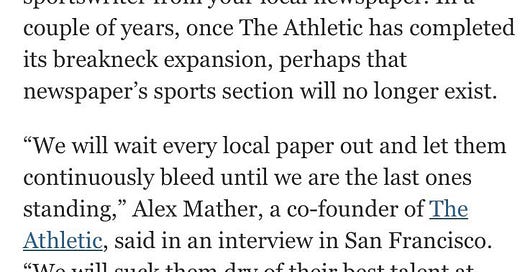Sports Media Startup The Athletic Sells to the New York Times for $550 Million
Every Monday morning, I write an email newsletter discussing the business, culture and stories behind sports and entertainment. Subscribe now for free if you would like to receive it directly in your inbox every Monday.
Hey Team,
Thanks for tuning in to The Fast Break.
If this is your first time, welcome! If not, thanks for coming back.
If you haven’t before, can you do me a 5-second favour? Please reply to this email saying “Yes”?
Doing so will ensure my newsletter ends up appropriately in your inbox instead of the spam folder :)
Executive Brief: The Athletic inked a significant acquisition deal with the New York Times selling the subscription-based digital media startup to The Times. Today’s newsletter discusses The Athletic’s ascension to digital sports media dominance, details of the deal, and how I think it benefits both companies. Enjoy!
In 2017, co-founder of The Athletic Alex Mather stated, “We will wait every local paper out and let them continuously bleed until we are the last ones standing. We will suck them dry of their best talent at every moment. We will make business extremely difficult for them.”
He was sort of right, but The New York Times bought his company in the end.
Last week, The Times announced that it acquired digital sports media startup The Athletic for $550 million in cash. The deal should close on April 1st, 2022, officially.
The Athletic’s Story
The Athletic was founded in 2015 by Alex Mather and Adam Hansmann, former co-workers at subscription-based fitness company Strava, with the mission of producing “smarter coverage for die-hard fans.” The company was built as an alternative to the struggling ad-supported models. The Athletic was a part of Y Combinator’s summer 2016 batch of startups.
The digital media platform launched in Chicago in January 2016. In October 2016, The Athletic expanded to Toronto to focus on Toronto-sports coverage. From there, it grew to every city it could in the U.S., Canada, U.K. and Europe over the ensuing six years.
Since its inception, the company has hired hundreds of journalists across the U.S., the U.K., Australia, and Canada, among others, to produce high-quality long-form journalism about sports. The company started working with advertisements and investing in podcast content more recently. The Athletic came to prominence when U.S. newspapers were losing large swaths of their staff through layoffs. Mather and Hansmann recruited aggressively from the ranks of beat reports and columnists in local markets, offering significant pay increases.
Before The Times’ acquisition, The Athletic relied on subscription revenue, not advertising revenue, to support the business, which will change when it comes under The Times’ wings. That said, since 2015, the underlying value proposition pitched by The Athletic was that sports fans would pay for good reporting and writing, a clean app, and no advertisements. Early in its life, this proposition rang true as a few newspapers were trying out paywalls, but the standard industry view was that information on the internet needed to be free.
As of August 2019, The Athletic had 600,000 paying subscribers with an 80% retention rate year-over-year. In September 2020, The Athletic announced 1 million global subscribers.
The Athletic’s direct competitors include the Ringer, Bleacher Report, Yahoo Sports and ESPN.com. Like many competitors, The Athletic laid off staff early in the pandemic but has restarted hiring since then. The company employs about 600 people full-time, including around 400 editorial staffers. In six years, The Athletic has become the second-largest employer of sports journalists in the country behind the Disney-owned ESPN.
The Athletic doesn’t often disclose financial details, including whether it is profitable. That said, a person familiar with the company stated that it likely generated around $80 million in 2020. It has also been reported that The Athletic brought in about $65 million in 2021 with operating losses of roughly $55 million.
In 2021, The Athletic announced that it now provides in-depth coverage of more than 200 professional teams in North America, Britain, and Europe.
The Athletics Funding to Date
Since its inception, The Athletic has raised just under $140 million over five rounds of raises.
January 2017: It raised $2.3 million in Seed funding, led by Courtside Ventures.
July 2017: It raises $5.4 million in Series A funding, led by Courtside Ventures.
March 2018: It raised $20 million in Series B funding, led by Evolution Media.
October 2018: It raised $40 million in Series C funding, co-led by Founders Fund and Bedrock Capital.
May 2019: It raised $21.8 million in Series C funding, led by Founders Fund.
January 2020: It raised $50 million in Series D funding, led by Bedrock Capital Partners.
The Athletic had a post-money valuation in the range of $500 million to $1 billion as of January 23, 2020, according to PrivCo.
Of course, the company has now been acquired for $550 million by The Times.
The Deal Makes Sense for Both Sides
The deal makes sense for both The Athletic and The Times.
Before this deal, The Times was sitting on $1 billion in cash. The company recently stated that it wants to reach $10 million paid digital-only subscribers by 2025. The acquisition of The Athletic adds substantially to its subscription portfolio, putting The Times in a strong position to reach its goal. Since the purchase, The Times has stated that its goal is now larger than 10 million subscriptions. They believe The Athletic will help leverage the group’s cohesive powers to swallow up more potential subscribers in the addressable market. The acquisition accelerates The Times’ ability to scale and deepen subscriber relationships for The Times itself.
For context, The Times currently has $8.4 million subscriptions, with 7.6 million being digital-only. The Athletic adds its 1.2 million subscriptions to the count.
The deal is a huge win for The Athletic, which shopped a sale for most of 2021. The subscription-based sports media company was under pressure to sell, considering how much cash it’s lost over the past two years. The company is driven by high expenses and reliance on venture capital funding instead of operational revenue.
The Athletic’s co-founders, Alex Mather and Adam Hansmann, will stay on after the deal. Mather will be The Athletic’s general manager, and co-president and Hansmann will be the chief operating officer and co-president. Meanwhile, David Perpich, Head of Standalone Products at The Times, will be their direct report. Standalone Products at The Times will become the publisher of The Athletic. Perpich currently managers The Times ancillary subscription products, like Wirecutter, and Games and Cooking. The Athletic will be a subsidiary company of The Times and operate separately. The Athletic will operate separately from The Times’ newsroom and its sports section.
The Times expects The Athletic to be “immediately accretive to The New York Times Company’s revenue growth rate.” However, The Times “expects the acquisition will be dilutive to The New York Times Company’s operating profit for approximately three years, as it scales subscriptions and builds an advertising business, and accretive thereafter.” For more, read here.
To me, the value proposition that the company was initially founded on will likely be turned on its head as the product starts to include advertising in its business model. The questions will be:
How much advertising are we talking about?
Will it dilute the aesthetic and usability of the platform?
Will subscribers care?
Will subscribers see ads, or will just free users see the ads?
Pending how the companies answer these questions, user rates will fluctuate accordingly. That said, The Athletic isn’t being forced into ads right away, the leadership team has time to determine the best method of moving forward on that front. There will also be questions about which writers stay on with The Athletic. There has been no indication of cuts as a part of the merger, but only time will tell.
The Times plans for The Athletic to eat into its profitability over the next three years before adding to the bottom line as it adds new subscribers and more advertising revenue. There are no plans to lay off any journalists from The Athletic as a part of the merger.
Previous Potential Deals for The Athletic
The deal comes when the consolidation of media companies has become commonplace. Late last year, Vox Media acquired Group Nine Media. Meanwhile, BuzzFeed acquired Complex at the end of 2021 and went public via a SPAC shortly after BuzzFeed had already acquired HuffPost.
In March 2021, The Athletic and news startup Axios formally discussed a merger as part of a plan to build a more prominent online publishing company that could include going public through a SPAC. Shortly after news broke of Axios and The Athletic discussions, The Times approached The Athletic to discuss the potential acquisition. Vox Media also expressed interest in The Athletic in the summer of 2021. The original deal talks tapered off at the end of June 2021.
In November 2021, rumours started to swirl gambling platforms like FanDuel (Flutter Entertainment) and DraftKings might acquire The Athletic. Spokespeople for The Times have not ruled out the option of The Athletic becoming a betting platform itself as a part of the new business model.
Regarding where the relationship could go, The Times has a mixed track record in terms of its deals. It bought the Boston Globe in 1993 for $1.1 billion, only to sell it for $70 million in 2013. The Times bought About.com in 2005 for $410 million in cash and sold it to IAC for around $300 million in cash in 2012. Meanwhile, its more recent acquisitions were much smaller in scope, including Wirecutter, Serial Productions, Fake Love, among others.
I expect The Athletic to be more lucrative for The Times than its previous deals for multiple factors. If the future advertising portion of the business doesn’t dilute the platform’s current aesthetic, the company should not lose many current subscribers that it has maintained year-over-year. Additionally, The Times confirmed that The Athletic would operate independently and separately from its newsroom, thus giving The Athletic the runway to do what it does best. As the media world continues to go digital, The Athletic should continue to grow, especially with it currently being the second-largest sports journalist employer outside of ESPN. The Athletic also has the advantage over many other media companies in that it operates solely digitally. There are numerous markets for The Athletic to grow into in terms of countries and sports coverage. International expansion will likely become a priority as will covering more sports. The Athletic also provides The Times with a platform to start considering sports betting with its built-in ready user base.
Thank you for reading. Have a great day, and we’ll talk next week!
Please subscribe, share with friends, and follow me on social media if you like this newsletter. You can also drop a comment below to let me know your thoughts.
Kendal
Question of the Day
Do you have a subscription to The Athletic? If yes, what do you think of it?
Games of the Week
NBA
Tues, January 11th: Golden State Warriors @ Memphis Grizzlies at 8:00 p.m. (E.T.)
Wed, January 12th: Brooklyn Nets @ Chicago Bulls at 10:00 p.m. (E.T.)
NHL
Mon, January 10th: Boston Bruins @ Washington Capitals at 7:00 p.m. (E.T.)
Tues, January 11th: Toronto Maple Leafs @ Las Vegas Golden Knights at 10:00 p.m. (E.T.)
NFL - NFL Wild Card Weekend






